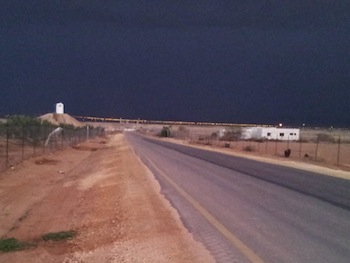We are developing the social individualist meta-context for the future. From the very serious to the extremely frivolous... lets see what is on the mind of the Samizdata people.
Samizdata, derived from Samizdat /n. - a system of clandestine publication of banned literature in the USSR [Russ.,= self-publishing house]
|
While driving up Israeli Highway 90 along the west bank of the river Jordan from the Dead Sea to Galilee last Friday, I passed the turnoff to the actual site on the river Jordan where St John the Baptist baptised Christ. I really couldn’t miss the place where the Holy Spirit descended on Christ in the form of a dove and God said he was pleased with his son, so I turned down the road, and drove towards the Jordan.
Half way to the river, I found this

The Israeli army had erected a barrier preventing anyone from continuing down the road to the river, with barbed wired etc, and a sign saying “Military Area. No Photography” or some such. (The area was closed to visitors from the 1967 war until 2010, but it was supposed to have been open since then). There was nobody there, but as being arrested by the Israeli military in the middle of the West Bank is not my preferred activity on a Friday evening – they are probably particularly annoyed when you ruin their Shabbat – I really didn’t want to take any risks. Thus I drove drove some distance back down the road before turning around to take photographs, and then only used the camera in my phone, which makes it less obvious what I am doing than holding up my digital SLR. I don’t know the reason for the closure: possibly just that the River Jordan is in some sense the border (although in this part of the world, who the fuck knows where the border is?) and they don’t want people too close to it.
In any even, in truth I didn’t want to stay too close to it for too long either. The Israeli built and controlled highways are safe enough. Highway 90 is by far the shortest route from south-east Israel to north-east Israel – which was why I was driving on it – but it was clearly built principally for security purposes. In the event of another war, the Israeli army can undoubtedly be mobilised along it very rapidly. However, being off the highway with a car carrying Israeli plates is probably best avoided.
The above picture is of the Church of Jesus Christ the Adolescent, which is found on the top of a hill in Nazareth in Israel. It presumably gets its name from the fact that Jesus Christ did apparently spend his teenage years in Nazareth. I post the picture merely because everyone I have shown the picture to so far has laughed at the name.
Thinking about it more, though, asking people to complete the phrase “The Church of Jesus Christ the…” with the most entertaining ending is possibly almost as much fun as “For all its faults,…”.
(Yes, I think Evelyn Waugh played with this exact idea in The Loved One. It is still fun, however).
Michael Jennings is now, as he recently said here that he would be, in Israel. Knowing my fondness for amusing multilingual signs, he today emailed me this photo, taken in Acre:
At first I thought that “Crusader” was some kind of business brand, although on second thoughts probably not. Maybe … actual crusader latrines? To clear up any doubt, Michael added:
It means exactly what it says.
Yes indeed, these are latrines which were once upon a time used by crusaders. And here, I presume, are those very latrines.
Don’t you just love the internet?
I am going to be in Israel from the 20th to the 28th of January. The plan is to be in Tel Aviv for two or three days from the 20th, then hopefully Jerusalem, Haifa, Nazareth, perhaps a little wine tourism in the Golan Heights, and Beersheba if I have time, which I may not. This will be my first trip and as always, there can be more visits. One of the purposes of a first trip to anywhere is to find out about the interesting things to do and see on subsequent visits.
The aim, as is the case with most of my travel, is to go, look round, and try to get some sense of the place. In Israel, the cultural and architectural magnificence of the place makes this particularly daunting. I am coming with the sense that Israel is one of the most egregiously missing places from my travels, but also with a certain amount of cultural baggage. I attended Anglican Sunday school as a child, of course, but was taught my biblical history in the sense that it felt that these were mythical places. That they were actually real took a more adult understanding.
Plus of course, there is the modern economy: every government in the world has seemingly released press releases stating how “We must create the Silicon Valley of (wherever)” (seemingly failing to understand that by government direction is not how you do it), but Israel seems to be virtually the only country in the world with a startup and tech economy scene that is actually worthy of such a description. My admiration for this is enormous, but my detailed knowledge of it is less than I would like it to be. If anyone wants to tell me more about this / show me how this has happened, I would be delighted to let them tell me and/or show me.
Several of my Jewish and Israeli friends have already offered me advice on what to see and do, of course, but further advice would be welcome, particularly from readers of this blog who may have some sense of my quirky sensibilities. Comments on this post are welcome, as is e-mail to michael.jennings at gmail.com. I promise to write about interesting things that I find on this blog.
As was flagged up by this recent SQotD, I have been reading The Last Crusaders by Barnaby Rogers, the point of this posting being that some of these Last Crusaders were also the first global explorers. This can’t be a review, because I have only reached page 50 out of 481, but I will be very surprised if my good opinion of this book now is in any way challenged by the experience of reading the rest of it.
A question that had always vaguely puzzled me, in a very not-thinking-about-it-carefully way, was: why Portugal? How come Portugal, of all now rather insignificant little backwaters, was the country that lead the way in the European conquest of so much of the rest of the world, a gigantic epoch only now drawing to a close?
It is of course not at all hard to see how this should be. Portugal may now be a backwater (I’ll say more about that at the end of this posting) but in the fifteenth century, from the point of view of exploring the world, it was a frontwater. All you need to do to understand how Portugal led Europe into the big wide world out there is to stop looking at the Portuguese East Indies or the various Portuguese parts of Africa or South America (which is what I had been doing), and look instead at Portugal itself, and its immediate surroundings. Once you do that, Portugal making the first big steps in the when-Europe-ruled-the-world story is not just explicable, it is close to inevitable.
Time for a date. In 1415, Portugal captured and, even more significantly, subsequently held the North African trading city of Ceuta, just across the Straights of Gibraltar from Gibraltar itself. They hoped this would drop into their laps all the trade that was done between West Africa and everywhere else through Ceuta. But not for the first or last time, grabbing the physical place turned out not to mean effortlessly controlling what had previously gone on there. Nevertheless, it was a start, by which I mean a start in the process of Europe confronting Islam not in the obvious way, but the other way. The obvious way was to bash on against Islam in the Eastern Mediterranean and surrounding parts, the Balkans, North Africa and what we now call the Middle East. The other way, of course, as we now all know, was to go round it.
Forget for a moment all the European nations who subsequently did this, and forget all the many places the world over that they arrived at and did business in and with. Consider only the very first steps in that process, that needed to be taken in the early fifteenth century. What did they consist of? Basically, someone European needed to sail down the coast of West Africa, establishing bases and trading relationships along the way.
If this had been easy, Portugal would probably never have lead the way. Spaniards, Genoese and Venetians, even though preoccupied with that Islam bashing in other parts of the Mediterranean world, would probably have overwhelmed those very early Portuguese efforts. But crucially, it was not easy. The Atlantic was a huge barrier, requiring huge efforts before even the possibility of profit could cut in. So far so obvious. But what is less well known nowadays (certainly not known by me until now) is that something similar applied to the West Coast of Africa. → Continue reading: How Portugal led the world past the Cape Bojador barrier
A Janes email newsletter this week reports that:
Israel retains strike option as IAEA strips away Iranian nuclear facade
Israel plans to give the international community time to draft and impose a series of tough sanctions against Iran in relation to its nuclear programme but has not ruled out the possibility of pre-emptive military action at a later date, Jane’s understands from senior government officials. Their comments followed the 8 November publication of an International Atomic Energy Agency (IAEA) report expressing concern based on mounting evidence that Iran is pursuing the development of nuclear weapons, conducting research and tests that are only relevant for the design of a weapon
Next thing you know, they will discover that Israel has teeth enough to respond to an attack or threat… in kind.
Recently a friend told me something about kibbutzes (kibbutzim?) in Israel, which got me into speculation mode. My friend had, he told me, met quite a few people in the course of his various globetrottings who, attracted by the aura of idealism and general world-savingness that kibbutzes radiate, had spent time in a kibbutz. Such pilgrims, said my friend, had quite soon left, all of them disgusted by the experience. Far from being havens of a higher form of humanity, kibbutzes are incubators of nastiness and personal backbiting and unpleasantness of all kinds. Kibbutz life, said these people, had cured them of socialism for ever. Which makes me speculate that kibbutzes are, for this reason, a spectacularly good thing, for the people thus inoculated, and for the world, in more ways than I can count in a short blog posting.
The only kind of people said my friend, who live well in kibbutzes are, well, the kind of people who live well in kibbutzes. People who thrive under totalitarian socialism, basically. Good at politics, good at screwing people without appearing too obviously to screw them, in accordance with the rules of rigid egalitarianism. There are lots of rules, to suppress individualism, getting ahead, getting richer, and so on, and the individuals who understand these rules use them ruthlessly to get ahead, and even, if you are flexible about how you measure wealth, to get wealthy.
These “alpha personalities”, as my friend described them, stick around, ruling the kibbutz with a rod of egalitarian iron. Many of the people lower down the Greek alphabet, without whom these alphas would presumably be rather helpless, are the transients, some of whom my friend had talked with. Young idealists, for whom life on a kibbutz is some kind of rite of Jewish passage. They arrive, serve their time until they can stand it no longer, and leave, taking with them an education in the realities of egalitarian collectivism that is given to few others in what is basically, still, a moderately free world. They experience such a regime good and hard, in a form that they can contrast with a life outside that kibbutz that is still massively freer, and then leave, taking that knowledge with them.
So, in addition to being one of the great new hubs of technological innovation in the world, the state of Israel, by permitting with its laws (including, presumably, a law which says that kibbutzes may not imprison those who no longer consent to being there), and encouraging with its ideological traditions, master classes in the realities of collectivism, is doing the world another huge favour. Kibbutzes are, you might say, re-education camps for precisely the sort of people who most require such re-education, and at a time in their lives soon enough to make a huge difference, to them and to the world.
I am a huge admirer of that human semi-collectivity called Jews, and pretty much an uncritical supporter of the state of Israel in its ongoing struggle to stay in existence and to flourish. But, and please do not misunderstand this next bit, I sort of agree with some of the more admiring bits in the ravings of the world’s many anti-semites, present and past. Jews are rather special. A century ago or so, Jews did have an influence on the world that was far greater than their mere numbers would seem to have allowed. (I am a classical music fan, and the sheer scale of the Jewish presence in that world has been and remains extraordinary.) It did not follow from the super-achievements of Jews that therefore the Jews were evil and should all be murdered, and it does not follow now. But, they were a group of people very much to be reckoned with, and they surely still are, again way beyond their mere numbers in the world.
I therefore now surmise that an ongoing education programme, which turns energetic, adventurous and idealistic young Jews from devotees of collectivism in devotees of something more like the opposite, has got to be one of the very best things now going on in the world.
But, this is pretty much all speculation on my part. The question mark at the end of my heading is no mere afterthought. I admire Israel from afar, but have never been there, nor have I travelled very much in the world. (Maybe if I spent more time in Isreal, I would admire it less.) So I end with all the usual questions which thinking-aloud, but-what-do-I-know?, guess postings of this kind generally do and always should end with. Does any of the above make sense to any of our commentariat? In particular, how do the above speculations strike any readers of this who have pertinent knowledge of the matters I speculate about, of the sort which I do not have, beyond that small item of chat from a friend?
I can well imagine that kibbutzes might indeed do a bit of the good I describe, but be doing a lot more harm in other ways. Also, my friend, being of a strongly anti-collectivist inclination himself, could have been suffering from severe selection error. Maybe the world is full of Jews who have lived in a kibbutz and would like nothing less than to kibbutzise the entire world. But, I like to think not.

And the Lord saith unto Achmed from on high, “Seventy virgin Windows. Windows you idiot, not Women!”
Photo: copyright Dale Amon, All Rights Reserved
There is not a lot for me to add. Just go watch it.
One thing comes through to me as I hear the stories from those doing their part for the remembrance. Far from destroying America, the lowly jihadi’s have created a powerful religious symbol. The World Trade Center has become a site of enormous power. Tiny pieces of metal from the site have been forged into religious icons. They are a part of a warship, a part of wind chimes for a church. They are items treated with great awe and reverence, perhaps as much as were bits of the ‘one true cross’ to generations of the distant past.
To the Jihadi’s and to those who think they will one day bring Shari’a to America, I say, “You have not only failed. You have created icons of greater power than your Mecca.”
I will go further. Two thousand years from now you and your icons will be remembered only in dusty historical archives. The World Trade Center site will still be there and will have gained a patina of age and legend, a tale of demons who came from out of the East and carried death, destruction and great evil with them as they battered a brave and honorable people.
But the more evil they did, the more the forces of good grew, until one day the hand of all peoples were raised against them and they were cast back into the lowest depths of hell and provinces of the damned from whence they had come.
Jihadi’s, you are done. Your dreams are dead. Your followers are dead or will soon be dead. Your beliefs will be forgotten. You have made us stronger and you and all about you are dust in the winds of time.
I do not have to curse you. You have cursed yourselves.
I hope the reports of rebel triumph prove to be the case… and kudos to the UK and France for helping things along whist also resisting the urge to get too deeply involved.
But that said, I cannot help but hope the dirty secrets now emerge of how overseas politicians aided and abetted Qadaffi over the years, in particularly the disgusting deal over Abdelbaset al Megrahi. It would be wonderful to see the polities in England and Scotland take one in the face if the unlovely details eventually come out.
I am a busy person this weekend so I haven’t time to do much more than to link to this fascinating interview with a former CIA operative on his experiences of living in Iran. With all the troubles in the world right now, it pays to keep an eye on a country and a regime that continues to be a serious threat. More optimistically, though, if Iran ever did move towards genuine openness and democracy, the impact on the rest of the Middle East region would be immense.
This struck me:
“If the Iranian regime dared for one day, for even half a day, to allow Iranians to come into the streets and say what they really want, then you would see tens of millions of Iranians in the streets shouting “Death to the Islamic Republic!”
“If there were a free referendum today, “yes” or “no” to the Iranian Republic, more than 90 percent would say “no.” If there were a free referendum today saying “yes” or “no” to establishing ties with America, more than 90 percent would say “yes.””
|
Who Are We? The Samizdata people are a bunch of sinister and heavily armed globalist illuminati who seek to infect the entire world with the values of personal liberty and several property. Amongst our many crimes is a sense of humour and the intermittent use of British spelling.
We are also a varied group made up of social individualists, classical liberals, whigs, libertarians, extropians, futurists, ‘Porcupines’, Karl Popper fetishists, recovering neo-conservatives, crazed Ayn Rand worshipers, over-caffeinated Virginia Postrel devotees, witty Frédéric Bastiat wannabes, cypherpunks, minarchists, kritarchists and wild-eyed anarcho-capitalists from Britain, North America, Australia and Europe.
|







